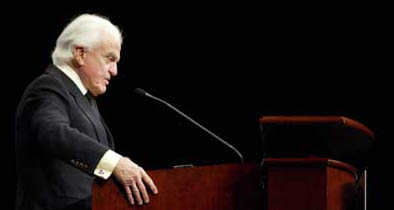Top 10 Film Industry Stories of 2004: #3: Jack Valenti Steps Down from the MPAA
By Stephanie Star Smith
December 30, 2004
The MPAA, believe it or not, has been overseeing the certification of movies as morally acceptable since the 1930s. Originally formed in 1922 as a trade association, when the public outcry over the lack of morality in the movies began in the wake of the Fatty Arbuckle scandal in the early '20s, the MPAA switched focus to policing the industry before Congress did it for them, creating the Production Code. Known colloquially as the Hays Code, after the MPAA's first president, the code mandated a strict set of rules that studios were to follow regarding what could and couldn't be shown on-screen, lest the film not receive a Code Seal. Films that didn't receive a Code Seal couldn't be distributed in the United States, at least not with much chance of reaching an audience, and so the studios toed the line.
By the mid-'60s, however, public mores were changing, and studios increasingly challenged the restrictive Hays Code, to the point where films were ignoring the Code outright and giving pictures without the Code Seal to smaller distributors, which then exhibited them to audiences about the same size as those for approved pictures. But even as the studios sought to throw off the yoke of the Production Code, there were still the bluestockings to consider, and the industry still preferred to police itself rather than be policed from outside. Into the fray stepped Jack Valenti, who in 1966 took over presidency of the MPAA, and it was Valenti who gave birth to the ratings system we all know today.
Jack "Boom Boom" Valenti presided over the MPAA with as close to an iron hand as one gets in Hollywood, bringing movie producers to heal with the somewhat-less restrictive ratings system. In turn, however, Valenti went to bat for the studios whenever lawmakers threatened to interfere in the creative process, demonstrating an ability to keep both sides of the issue, if not entirely happy, at least willing to go along with the program. The advantage of the ratings system over the Hays Code was twofold. First, there was not a set of guidelines that filmmakers had to follow in order to receive the literal Seal of approval. A director could shoot the film he wanted, show it to the MPAA board, and receive whatever rating the board deemed fitting. In quick order, the industry learned what would garner a G, PG or R rating, and how to get round certain restrictions through editing and/or camera angles. The second advantage was the right of appeal, something that was unheard of during the era of the Production Code. If a filmmaker disagreed with the MPAA's rating assignment, he or she could argue the case directly in front of the board. At the very least, this offered the filmmaker a chance to talk to the people who made the decisions directly, and that input resulted in at least the feeling that the film received a fair shake, even if the rating wasn't changed. And compromises could be, and often were, worked out; an edit here, a dialogue change there, and presto! An R rating becomes a PG-13, and a wider audience was potentially won.
But as often happens as time passes, Valenti increasingly lost touch, not only with industry standards but the changing tastes and mores of the moviegoing audience. And the more he lost touch, the more Valenti seemed to want to clamp that iron grip even further, often angering not only those on the creative end of things, but the other members of the MPAA as well. But it was the fight over piracy, specifically the sharing of films over P2P networks, that brought things to a head. In an egregiously ill-advised move, Jack Valenti decreed just before awards season in 2003 that AMPAS was not to send out any screeners to its members, a move that incensed the industry in general and independent filmmakers in particular, as the Academy screeners were the best way to ensure that the Oscar voters saw the smaller films. Valenti relented in the face of the uproar, but his fate was sealed; no longer trusted to even know where to take the industry's pulse, much less having his finger on it, Valenti finally announced his retirement from the presidency of the MPAA earlier this year. Although he will still be involved in some capacity, now that his successor, former Congressman Dan Glickman, has taken office, Jack "Boom Boom" Valenti is no longer be in charge of the ratings system he created, and an era has come to an end. Valenti was, oddly, both the best advocate Hollywood had and one of its worst enemies, and his departure from the MPAA will be felt for many years to come.




